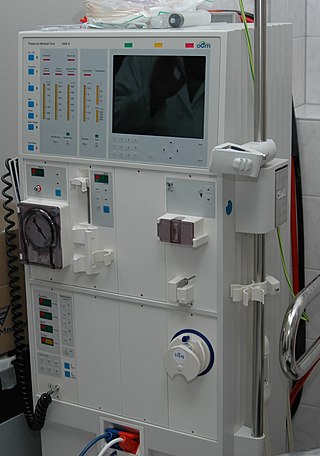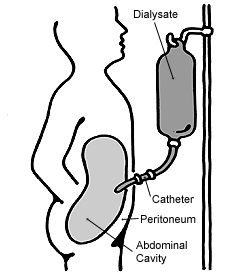Nephrology is a specialty for both adult internal medicine and pediatric medicine that concerns the study of the kidneys, specifically normal kidney function and kidney disease, the preservation of kidney health, and the treatment of kidney disease, from diet and medication to renal replacement therapy. The word "renal" is an adjective meaning "relating to the kidneys", and its roots are French or late Latin. Whereas according to some opinions, "renal" and "nephro" should be replaced with "kidney" in scientific writings such as "kidney medicine" or "kidney replacement therapy", other experts have advocated preserving the use of renal and nephro as appropriate including in "nephrology" and "renal replacement therapy", respectively.

Kidney dialysis is the process of removing excess water, solutes, and toxins from the blood in people whose kidneys can no longer perform these functions naturally. Along with kidney transplantation, it is a type of renal replacement therapy.

Kidney failure, also known as end-stage renal disease (ESRD), is a medical condition in which the kidneys can no longer adequately filter waste products from the blood, functioning at less than 15% of normal levels. Kidney failure is classified as either acute kidney failure, which develops rapidly and may resolve; and chronic kidney failure, which develops slowly and can often be irreversible. Symptoms may include leg swelling, feeling tired, vomiting, loss of appetite, and confusion. Complications of acute and chronic failure include uremia, hyperkalemia, and volume overload. Complications of chronic failure also include heart disease, high blood pressure, and anaemia.

Chronic kidney disease (CKD) is a type of long-term kidney disease, in which either there is a gradual loss of kidney function occurs over a period of months to years, or abnormal kidney structure. Initially generally no symptoms are seen, but later symptoms may include leg swelling, feeling tired, vomiting, loss of appetite, and confusion. Complications can relate to hormonal dysfunction of the kidneys and include high blood pressure, bone disease, and anemia. Additionally CKD patients have markedly increased cardiovascular complications with increased risks of death and hospitalization. CKD can lead to kidney failure requiring kidney dialysis or kidney transplantation.

Peritoneal dialysis (PD) is a type of dialysis that uses the peritoneum in a person's abdomen as the membrane through which fluid and dissolved substances are exchanged with the blood. It is used to remove excess fluid, correct electrolyte problems, and remove toxins in those with kidney failure. Peritoneal dialysis has better outcomes than hemodialysis during the first couple of years. Other benefits include greater flexibility and better tolerability in those with significant heart disease.
Renal osteodystrophy is currently defined as an alteration of bone morphology in patients with chronic kidney disease (CKD). It is one measure of the skeletal component of the systemic disorder of chronic kidney disease-mineral and bone disorder (CKD-MBD). The term "renal osteodystrophy" was coined in 1943, 60 years after an association was identified between bone disease and kidney failure.

Robert Provenzano is an American nephrologist. He is also an Associate Clinical Professor of Medicine at Wayne State University School of Medicine.
Dialysis Clinic, Inc. is a nonprofit medical corporation founded in 1971 and chartered as a 501(c)(3) tax-exempt organization under IRS regulations.
Nathan W. Levin is an American physician and founder of the Renal Research Institute, LLC., a research institute dedicated to improving the outcomes of patients with kidney disease, particularly those requiring dialysis. Levin is one of the most prominent and renowned figures in clinical nephrology as well as nephrology research. He has authored multiple book chapters and over 350 peer-reviewed publications, including articles in leading journals such as Nature, the New England Journal of Medicine, and The Lancet.
Kamyar Kalantar-Zadeh is a US American physician doing research in nephrology, kidney dialysis, nutrition, and epidemiology. He is best known as a specialist in kidney disease nutrition and chronic kidney disease and for his hypothesis about the longevity of individuals with chronic disease states, also known as reverse epidemiology including obesity paradox. According to this hypothesis, obesity or hypercholesterolemia may counterintuitively be protective and associated with greater survival in certain groups of people, such as elderly individuals, dialysis patients, or those with chronic disease states and wasting syndrome (cachexia), whereas normal to low body mass index or normal values of serum cholesterol may be detrimental and associated with worse mortality. Kalantar-Zadeh is also known for his expertise in kidney dialysis therapy, including incremental dialysis, as well as renal nutrition. He is the brother of Kourosh Kalantar-zadeh, who is an Australian scientist involved in research in the fields of materials sciences, nanotechnology, and transducers.

Carmine Zoccali is an Italian nephrologist and a clinical investigator. He has contributed to research in several fields, most notably hypertension and cardiovascular complications in chronic kidney disease (CKD), CKD progression and clinical epidemiology of kidney diseases at large. He is known for his studies on cardiovascular risk in CKD and dialysis patients. He was among the earliest investigators that focused on the relevance of endothelial dysfunction and inflammation for the high risk of cardiovascular disease in these populations. In this research area, he was the first to link endogenous inhibitors of the nitric oxide system with death and cardiovascular disease. and the first to document a relationship between sympathetic over-activity and these outcomes Dr Zoccali is a practicing specialist in Nephrology, with a national qualification for the full professorship in Nephrology. He is also a specialist in hypertension, certified by the European Society of Hypertension (ESH).

The Translational Research Institute (TRI) is Australia's first translational medical research institute dedicated to translating scientific discoveries into applications for medical practice.
Sucroferric oxyhydroxide, sold under the brand name Velphoro, is a non-calcium, iron-based phosphate binder used for the control of serum phosphorus levels in adults with chronic kidney disease (CKD) on haemodialysis (HD) or peritoneal dialysis (PD). It is used in form of chewable tablets.
Sree Bhushan Raju M.D., D.M., Diplomate of National Board, is a nephrologist from Telangana, India. He is currently Senior professor and Unit head, Dept of Nephrology, Nizam's Institute of Medical Sciences Panjagutta, Hyderabad. Which is one of the largest Nephrology teaching Department in India having ten DM seats. He is one of the principal investigators of CKD task force by Indian Council of Medical Research (ICMR) to evaluate the prevalence of CKD in adult urban population in India. He is currently an associate editor of Indian Journal of Nephrology, Indian Journal of Organ Transplantation and Frontiers in Medicine. He is a popular advocator of Public Health and early detection of non-communicable disease. He frequency writes editorials in various Regional and National News papers about quality of care, public health, health care systems
Vlado Perkovic is an Australian renal physician and researcher who is the Provost at the University of New South Wales, Sydney, having previously been Dean of Medicine & Health at that University between 2019 and 2023.
Professor Wendy Elizabeth Hoy AO is a Fellow of the Australian Academy of Science (FAA), the Director of the Centre for Chronic Disease at the University of Queensland, Australia, and was appointed an Officer of the Order of Australia (AO) in 2010 and elected as a member of the Australian Academy of Science in 2015. Hoy's research has involved developing new types of kidney imaging and improving health and lives for indigenous populations, in Australia, Sri Lanka and the USA.
A renal diet is a diet aimed at keeping levels of fluids, electrolytes, and minerals balanced in the body in individuals with chronic kidney disease or who are on dialysis. Dietary changes may include the restriction of fluid intake, protein, and electrolytes including sodium, phosphorus, and potassium. Calories may also be supplemented if the individual is losing weight undesirably.

Andrew S. Levey is an American nephrologist who transformed chronic kidney disease (CKD) clinical practice, research, and public health by developing equations to estimate glomerular filtration rate (GFR), and leading the global standardization of CKD definition and staging.
Elizabeth Beatrice Lightstone is a British physician and consultant who is a Professor of Nephrology at Imperial College London. Her research investigates disease in kidneys such as lupus nephritis, glomerular disease and chronic kidney disease (CKD). Lighthouse has also investigated healthcare inequalities.
Peter Stenvinkel is a Swedish nephrologist and academic. He is a senior lecturer at Karolinska University Hospital and a professor of nephrology at Karolinska Institutet.







